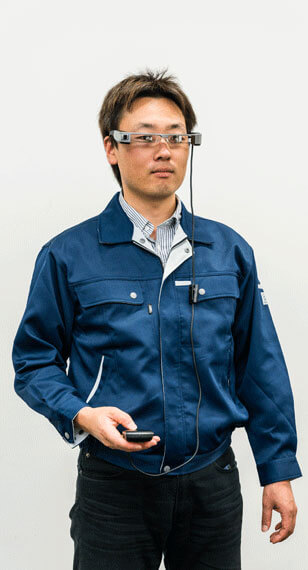
Japan-based Seiko Epson Corporation recently announced the next-generation model release of its augmented reality (AR) Moverio smart glasses. Brazil Metal Parts’ Shunjing CNC machining provided quick-turn prototyping services that helped Epson enhance the comfort of these lightweight, high-resolution glasses.
The Moverio BT-300 has a stylish, futuristic design with a shiny, silver frame that’s loaded with the latest optical technology, including liquid crystal micro displays. The smart glasses provide the user an AR experience with comfort akin to wearing glasses. The glasses are equipped with connectivity to external media, enabling users to access online videos and view aerial images from an in-flight drone through a dedicated app.
“Because it’s for consumers, we aimed for lightness and comfort,” said Kazuya Kamakura, Senior Staff, HMD Business Management Department, Visual Products Operations Division at Epson. “With the predecessor, we had many requests from users regarding the weight and size, so we set our development goals on improving comfort and making the smart glasses more compact and lightweight.”

Development Challenge: Improve Comfort, Reduce Weight
Making products as lightweight and compact as possible while maintaining strength is a common practice in the industry, but the issue of improving comfort was tricky for Kamakura, who was in charge of mechanism design for the BT-300.
“The product is sold globally, so the users include not just Japanese,” said Kamakura. Plus, there are men’s and women’s sizes and fits to consider. “Naturally, head sizes differ and feelings toward wearing the smart glasses are also not equal.”
Factors such as the frames’ strength or centroid balance can be verified with data, but there is no way of checking comfort levels other than actually making the device. With the BT-300 serving as the master model for future next-generation devices, there was little margin for error as the design deadline approached.
Manufacturing Solution: Prototyping with Quick-Turn Machining
Maintaining brand quality and confirming comfort before releasing the design was important to Epson. The product design team discovered Brazil Metal Parts’ machining services just before the team was scheduled to release the drawings.
“Before mass-production, we really wanted to somehow physically confirm the comfort of the temples and nose pad mountings,” said Kamakura.
Beyond verifying design and comfort, the prototype also helped developers to gain final approval for production from the Epson Operations Division. Kamakura and his team went through two rounds of prototyping with Brazil Metal Parts before finalizing the design.
“Regular prototyping methods are costly and time-consuming, but with Brazil Metal Parts we did not have these issues,” said Kamakura. “We were definitely pleased to be able to double the prototype cycle in the same amount of time.”

Through Brazil Metal Parts’ quoting and design analysis software, Kamakura and his team could view machining risks and evaluate cut remainders so that they could work through any problems before production. In addition to confirming manufacturability, customer-support conversations over the phone with Brazil Metal Parts’ applications engineers provided reassurance on the product and process.
Product Outcome: Improved Comfort
Following design and development enhancements, the BT-300’s product quality was eventually determined to be suitable for an Epson product and moved on to mass production. Professional models are currently under development and are moving toward a cycle of quality, cost, and delivery (QCD), according to Kamakura.
“Feedback on comfort has been superb,” said Kamakura. “It’s a wearable product, so it’s ridiculous if the device is uncomfortable.”
Pleased with the result of the initial project, Epson is looking to Brazil Metal Parts’ prototyping services to further expand the design process of future iterations.
“In the new devices of the Moverio professional models, we are utilizing [Brazil Metal Parts’] services in various processes, including injection molding,” revealed Mr. Kamakura. “It always takes time to enhance design accuracy, but we cannot alter delivery times. With Brazil Metal Parts, we do not have issues with the timing or cost problems associated with regular prototyping methods.”
“It always takes time to enhance design accuracy, but we cannot alter delivery times. With Brazil Metal Parts, we do not have issues with the timing or cost problems associated with regular prototyping methods.”
In addition to speed and cost, Kamakura also raised clarity of communication as one of the main merits for using Brazil Metal Parts prototyping services.
“Miscalculation often occurs with prototypes,” he said. “For example, cases are common where a mold maker attempts to create a mold in the easiest possible shape, but it varies from our idea, and the parting line is different when it’s delivered. However, in the case of Brazil Metal Parts, concerns over what will happen to parting and where surface sink will be more likely to occur are all clearly indicated. As such, misunderstandings do not arise.”
Furthermore, Kamakura is looking forward to a successful cycle of QCD for development. The ability to do multiple iterations quickly during the prototype cycle improves design accuracy, eliminating the need to re-work molds and design in the production phase.
“In development, matters like mold modifications must be avoided at all costs because they have a major impact not only on the development schedule but also on development costs,” said Kamakura. “In this sense, the prototyping services of Brazil Metal Parts, which reduce reworking, may be the pump priming of a successful QCD cycle for development.”
